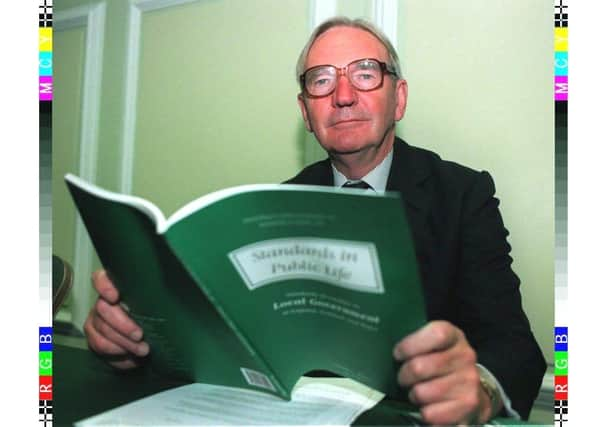Norman Hamilton: Politics should be about honesty and ethics, not cash and power


Currently I am an independent member of a local Policing and Community Safety Partnership.
On every occasion I have been required to commit myself in writing to upholding the seven long established principles of public life known as the Nolan principles – honesty, integrity, accountability, leadership, selflessness, objectivity and openness.
Advertisement
Hide AdAdvertisement
Hide AdMany people do not realise that the requirement to uphold these principles applies to every MP in Westminster, every MLA in Stormont, every elected councillor here in Northern Ireland, many public servants (including those in the PSNI and NHS), and every member of a public body such as that on which I currently serve.
As well as acting against corruption and scandal, these principles are intended to ensure that government and public service are carried out to the highest possible standard.
The principles were devised back in 1995 by a Westminster committee chaired by Lord Nolan, following the scandal of the ‘cash for questions’ affair, in which it was alleged that two Tory MPs had received thousands of pounds in return for asking parliamentary questions on behalf of behalf of the owner of Harrods.
It is significant that Lord Nolan’s committee chose to respond to the scandal by setting out qualities of character and behaviour rather than simply overhauling rules, regulations and protocols. In short, it meant that high ethical and moral standards were – and still are – considered central to the proper use of influence and power.
Advertisement
Hide AdAdvertisement
Hide AdThis, I believe, is of key importance as we head into 2024 with the potential of devolved government returning to Stormont.
The lack of money and resources to do all that should be done will inevitably mean real and ongoing difficulty, even if the promised £3.3 billion comes our way.
The list of areas where very difficult decisions will need to be taken has been growing for months, and has been widely documented.
It includes education, health and social care, public sector pay, and reviving Lough Neagh (if that is still possible), to say nothing of the need to build more houses, fix thousands of potholes, improve productivity and produce a workable anti-poverty strategy.
And there is the Northern Ireland Protocol.
Advertisement
Hide AdAdvertisement
Hide AdAt the heart of the Nolan Principles is the requirement for those in public life and with responsibility for using public money to work for ‘the common good’.
This means that the decisions taken in Stormont, in government departments, by public bodies and by local councils across the province should bring the widest possible benefit, with a particular eye on the most vulnerable. A commitment to doing so would dramatically change our politics and community life.
With so many mountains to climb, there is no place for tribalism, cronyism or divisive thinking and action. Of course, there is plenty of room for discussion and debate as to what the common good would look like.
That debate is very important, and must not be reduced to soundbites or slogans, for so much is at stake, but the aim of all sides must be the same: the principle of doing to others what you would want them do to and for you.
Advertisement
Hide AdAdvertisement
Hide AdI suggest that Lord Nolan’s seven principles – honesty, integrity, accountability, leadership, selflessness, objectivity and openness – can and do provide the much needed ethical and moral framework for the debates about how public policy should be both shaped and delivered.
I also suggest that the principles stand or fall together. Leadership needs proper accountability to ensure quality and limit the abuse of power.
Integrity and honesty are the bottom line for openness. Selflessness and objectivity end tribalism and sectarian thinking.
Across much of the Western world (in Paris, Washington, London and all the devolved regions) it seems quite clear that simply having a functioning government is not remotely the same as having good government in place, working for the common good. Yet this is exactly what is required if and when devolution returns to our shores.
Advertisement
Hide AdAdvertisement
Hide AdQuality government requires a powerful mix of ingredients which include (among others) a healthy vision for the future; competence in both decision making and getting things done by politicians and public servants; care for those who are struggling for whatever reason; and proper reward for jobs well done.
To make this happen I am firmly of the view that there is more to politics and political leadership than merely having access to the levers of power and money.
Lord Nolan was surely right when he emphasised the importance of personal character and personal behaviour back in 1995.
Human nature hasn’t changed since then, so those seven principles still provide the bedrock of an assured future for us all.
I long that our leaders will want to deliver them.
• Norman Hamilton is a former moderator of the Presbyterian Church